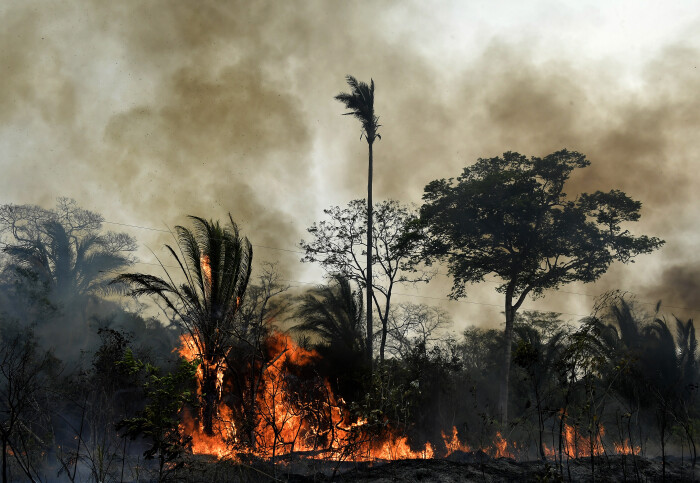The deadly late-winter heat in South America was intensified by climate change

The unseasonal heat in South America was at least 100 times more likely because of climate change, according to a study published this week.
The study by World Weather Attribution found that temperatures were 1.4-4.3ºC hotter because of human-caused climate change.
World Weather Attribution is an international team of climate scientists, co-founded and led by Dr Fredi Otto, Senior Lecturer at the Grantham Institute – Climate Change and the Environment at Imperial College London.
In South America, the prolonged period of unseasonal heat was widely linked to El Niño, a natural climate phenomenon that leads to warmer temperatures.
But the World Weather Attribution study found that human-caused climate change played a much greater role.
“While many people have pointed to El Niño to explain the South America heatwave, this analysis has shown that climate change is the primary driver of the heat,” said Lincoln Muniz Alves a Researcher at the Brazil National Institute for Space Research and one of the authors of the study.
“We want to be clear - a developing El Niño would have contributed some heat, but without climate change, spring heat this intense would have been extremely unlikely.”
At least four heat-related deaths have been linked to the heat in São Paulo, Brazil, though the total number of deaths is currently unknown.
The long-lasting heat came after many countries in South America experienced their hottest winter on record.
A combination of low rainfall and high temperatures have led to severe drought and rapid spread of wildfires in the Amazon rainforest, the world’s most important ecosystem and terrestrial carbon sink.
Massive numbers of fish have been reported throughout the Amazon as well as more than 120 pink Amazon river dolphins, who perished in Lake Tefé, Brazil after water temperatures reached 39°C (about 9°C hotter than normal for September).
Low water levels in the Amazon river have also seen people in nearby villages struggling to access drinking water.
On Tuesday, the same day as the World Weather Attribution study was published, a group of 63 Indigenous Amazonian tribes called on the Brazil government to urgently declare a climate emergency.
Preparing for hotter climates
Julie Arrighi, a Director at the Red Cross Red Crescent Climate Centre and one of the authors of the study says that heat is deadly, particularly before the start of summer when people aren’t yet acclimatised to hot temperatures.
“Temperatures above 40°C in early spring are incredibly extreme and while we are aware of just four heat-related fatalities, it’s likely the true number is much higher.”
The study found that in today’s climate, the September and August heat was a 1-in-30-year event, meaning it has about a 3.33% chance of occurring each year.
But if the planet warms by a global average of 2°C, similar heat events in this region are projected to be an additional 1.1-1.6°C hotter than this year and even more likely, occurring about once every 5-6 years, meaning the chance of it happening each year would be about a 20%.
Ms Arrighi said that countries need to prepare for the increasing risk posed by extreme heat.
“Good planning for heat can save lives. It is absolutely critical that every country and city develops a heat plan. It’s also important that key health providers carry out heat planning, because they bear the brunt of heat impacts.
“Such plans set out critical responses to heat including early warning systems and actions to protect the most vulnerable people.”
In every region of the world, heatwaves are expected to become hotter, longer, and more frequent until greenhouse gas emissions are reduced to net-zero.
Globally, this September was the hottest ever recorded, breaking the previous record by nearly 0.5ºC – a margin that has startled climate scientists – and attribution studies such as this continue to show the clear role that global warming in driving extreme heat.

Dr Fredi Otto, Senior Lecturer at the Grantham Institute – Climate Change and the Environment says the September heat record is a reminder of the urgency of moving to a cleaner, renewable basis for our energy, economy, transport and society.
“Temperature records continue to be broken because we have not stopped burning fossil fuels. It is that simple.
“This should be a wake-up call for policymakers and negotiators ahead of COP28 – we absolutely must agree to phase out fossil fuels.”
Header image credit: EU Civil Protection and Humanitarian Aid. "High temperatures have fuelled the spread of wildfires throughout the Amazon rainforest."
Article supporters
Article text (excluding photos or graphics) © Imperial College London.
Photos and graphics subject to third party copyright used with permission or © Imperial College London.
Reporter
Sam Ezra Fraser-Baxter
The Grantham Institute for Climate Change